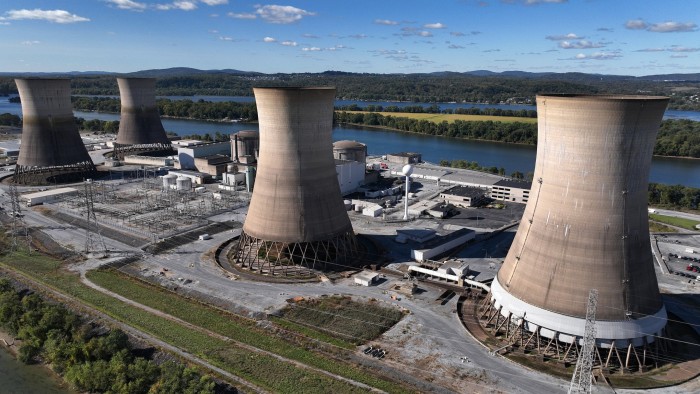Unlock the Editor’s Digest for free
Roula Khalaf, Editor of the FT, selects her favourite stories in this weekly newsletter.
The World Bank is lifting its decades-long ban on financing nuclear energy, in a policy shift aimed at accelerating development of the low-emissions technology to meet surging electricity demand in the developing world.
In an email to staff on Wednesday, Ajay Banga, the World Bank president, said it would “begin to re-enter the nuclear energy space” in partnership with the International Atomic Energy Agency, the UN nuclear watchdog which works to prevent proliferation of nuclear weapons.
“We will support efforts to extend the life of existing reactors in countries that already have them, and help support grid upgrades and related infrastructure,” the email said.
The shift follows advocacy from the pro-nuclear Trump administration and a change of government in Germany, which previously opposed financing atomic energy due to domestic political opposition to the technology.
It is part of a wider strategy aimed at tackling an expected doubling of electricity demand in the developing world by 2035. Meeting this demand would require annual investment in generation, grids and storage to rise from $280bn today to $630bn, Banga said in the memo seen by the Financial Times.
It said private sector investment was essential but businesses would need support from the bank, including tools like guarantees and equity. The bank would support a range of energy projects including solar, wind, geothermal hydro and natural gas power plants, where it does not “constrain renewables”, he added.
“We will also work to accelerate the potential of small modular reactors — so they can become a viable option for more countries over time,” the memo said.
Banga said the bank’s board did not yet agree on whether it should support upstream gas development. This would require further discussion, he said.
The decision by the multilateral lender to consider financing nuclear projects is a significant boost for the industry, which experienced a sharp contraction following the Fukushima nuclear accident in 2011.
The climate crisis and surging power demand due to the roll out of power hungry artificial intelligence technologies have already prompted many governments to reconsider atomic energy.
Nuclear plants can provide a stable baseline of emissions-free electricity, which can be augmented with intermittent supplies of solar and wind power at times of higher demand. But the projects are often met with resistance over fears of fallout from accidents, as with Fukushima, Russia’s Chornobyl in 1986 and the US Three Mile Island meltdown in 1979.
More than 30 countries signed a pledge during the COP28 climate summit in Dubai in 2023 to triple global nuclear capacity by 2050, with the aim of meeting the Paris Accord climate targets.
The World Bank has not backed a nuclear project since 1959, due both to opposition from Berlin and concerns from some countries about nuclear proliferation.
But Berlin’s new government led by Chancellor Friedrich Merz has dropped the nation’s opposition to nuclear. In May Berlin signalled to Paris that it would no longer block French efforts to ensure nuclear power is treated on par with renewable energy in EU legislation.
The nuclear industry hopes other multilateral lenders, including the Asian Development Bank, could now follow the World Bank’s lead. Cheaper government-backed financing is viewed as critical to construction of large nuclear plants, which are vulnerable to delays and cost overruns.
The US, the largest shareholder in the World Bank, and other pro-nuclear western nations have campaigned for the lender to revisit its prohibition on supporting nuclear projects.
They argue such a change would help western companies compete with state-owned nuclear giants in Russia and China that have begun building plants in developing countries. Russia’s Rosatom is building nuclear plants in Turkey, Bangladesh, China, India and Iran.
Last year the European Investment Bank opened the door to funding atomic energy projects following a successful lobbying campaign by big nuclear producers, including France.
